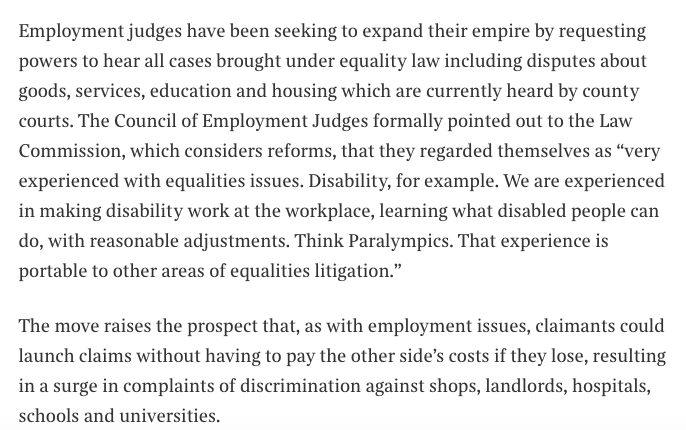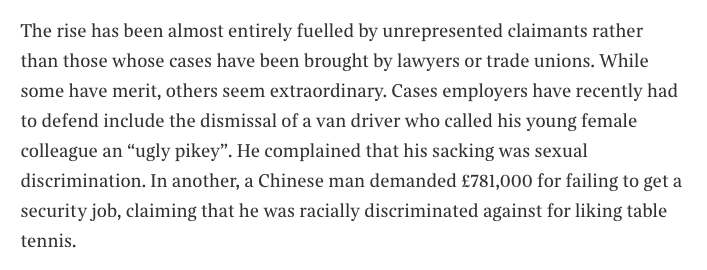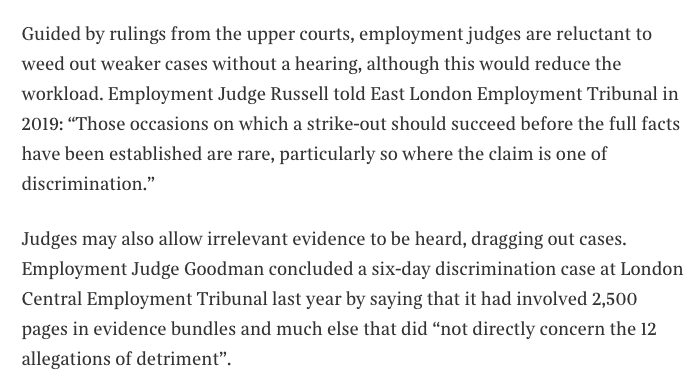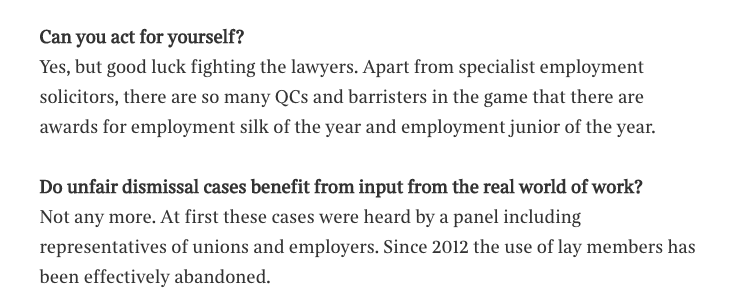
1/ A really odd hatchet job on employment tribunals in today's Times. Its purpose is unclear though I worry it might be part of the "we should reintroduce employment tribunal fees" PR campaign. #ukemplaw thetimes.co.uk/article/tribun…
2/ The piece starts by railing against the appointment of full time judges lacking any judicial experience. Erm, that'll be the 2019 cohort then, where no prior experience was necessary. Strange to report on that in 2021.
3/ Many of us will have been in front of salaried EJs who had no previous judicial experience. In my experience, the 2019 cohort have been uniformly excellent. But the author (Dominic Kennedy) is particularly concerned with trade union & town hall lawyers. 

4/ That seems a bit patronising to me. I'm not sure who from the Trade Union or town hall career paths were made up to salaried EJ, but I can think of a number of those who instruct me fitting those descriptions whose legal knowledge & analysis is particularly impressive.
5/ Next, the author speaks of the ETs being in "chaos" with a 40,000 backlog. The backlog is severe, no doubt. But I don't see chaos at present. The ET seems to have taken to the online world better than most jurisdictions & floating PTEJs are riding to the backlog rescue. 

6/ The author next bemoans the "power grab" under which it has been suggested the ET hear all equality cases rather than just workplace disputes.
It's a "power grab" I've always thought makes sense. EJs understand the EqA. It's their bread & butter. Many CJ (even ticketed) don't

It's a "power grab" I've always thought makes sense. EJs understand the EqA. It's their bread & butter. Many CJ (even ticketed) don't


7/ And here's why I wonder about the impetus behind this investigation - a suggestion that the 'struggle to cope' results from the 'surge' since the Unison decision. 

8/ The author of course doesn't set the 'surge' in context - no reflection on how it compares to the situation the ETs were used to dealing with before the unlawful introduction of fees. No reflection on the meritoriousness of the 'surge' of cases. Just disdain.
9/ The author cherry-picks a couple of ill-conceived cases (with no indication of how those cases got on, nor whether they were subject to cost orders, withdrawal etc) to prove his point that unmeritorious LiPs are now flooding the system. 

10/ The author then reverts back to his pet peeve about the lowering of the judicial bar to accept those without previous judicial experience as salaried judges. Now as I say, I think that must relate to the 2018 competition with Judges starting in 2019. What's his point? 

11/ The author is very much vexed by Anyanwu & the HL's warning against the striking out of discrim claims save exceptionally. He worries this means discrim claims are brought safe in the knowledge they won't be struck out & will go to trial. 



12/ He gives no consideration to the deterrence of deposit orders, nor to the possibility of costs orders in any event. He won't have read Vaughan v Lewisham, nor Radia v Jefferies on quite how crippling a costs order can be against a claimant.
13/ The piece ends with a Q&A section, which includes the suggestion that unfair dismissal claims don't benefit from "the real input of work" now that they're tried by judges alone, & that there are so many employment barristers & QCs that we have our own awards!!! 

14/ And in the final Q&A, the author gets to the real nub of the problem, which seems to be the change of name in 1998 from "plain old industrial tribunals" to employment tribunals.
Truly bizarre reporting from The Times.
Truly bizarre reporting from The Times.

• • •
Missing some Tweet in this thread? You can try to
force a refresh









